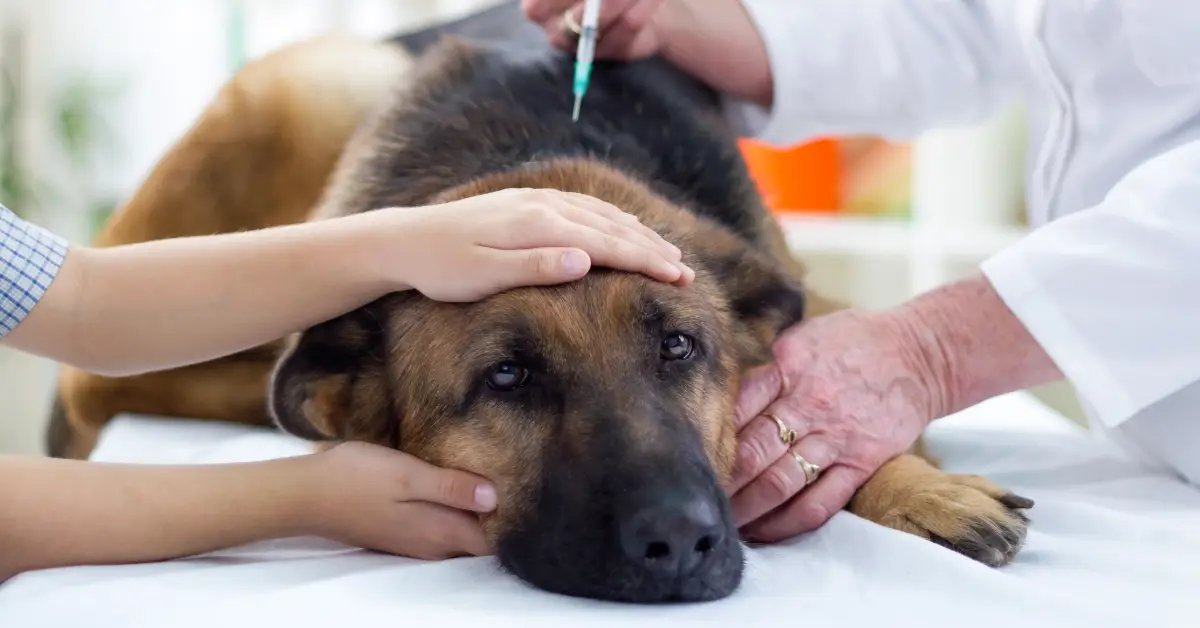Can Dogs Eat Tomatoes?

Yes! Dogs can safely enjoy tomatoes, but there are a few risks to be aware of so you can feed your dog responsibly.
Fully ripe tomatoes (without the stems and leaves) can actually have nutrients that are good for your pup. Tomatoes have chlorogenic acid, an antioxidant that can have anti-inflammatory effects in cells. They’re also a good source of fiber, aiding in digestive health and weight management. Lycopene, another potent antioxidant in tomatoes, has been linked to reduced risk of certain diseases.
Tomatoes also provide vitamins and minerals such as potassium, vitamins A, B9 (folic acid), C, K1, iron, and phosphorus.
It’s best to feed your dog fresh, ripe, red tomatoes, free of any green parts. They should be washed and cut into manageable pieces to avoid choking hazards. You can also make tomato-based treats at home, like blending ripe tomatoes into a puree and freezing them in an ice cube tray for a refreshing summer snack.
Tomato Toxicity for Dogs
You should only feed your dog the red parts of a tomato. That’s because of the risk of tomatine poisoning, which occurs when a dog ingests significant quantities of tomatine, a glycoalkaloid found in the green parts of the tomato plant, such as the leaves and stems, and in unripe (green) tomatoes.
Tomatine acts as a natural defense mechanism for the tomato plant, deterring pests and insects from eating it. While the ripe fruit of the tomato contains only trace amounts of tomatine and is generally considered safe for dogs in moderate amounts, the green parts contain higher levels and can pose a risk if ingested.
Symptoms of tomatine poisoning in dogs can vary depending on the amount ingested and the size of the dog but may include gastrointestinal distress (such as vomiting and diarrhea), loss of appetite, hypersalivation, drowsiness, confusion, behavioral changes, weakness, dilated pupils, and abnormal heart rate. In severe cases, tomatine poisoning can be life-threatening.
If you suspect your dog has ingested a harmful amount of the green parts of a tomato plant and is showing symptoms of tomatine poisoning, contact a veterinarian immediately for treatment.

Tomato-Based Products for Dogs
Many tomato-based products, such as ketchup, tomato sauce, and certain pasta sauces, are not recommended for dogs due to their non-tomato ingredients. These products often contain additives and condiments that can harm dogs, even in small amounts.
Here are some ingredients to watch out for in tomato products:
- Sugar and High Fructose Corn Syrup – Excessive sugar intake can lead to obesity, dental problems, and diabetes in dogs.
- Salt – While dogs need some sodium in their diet, too much salt can lead to dehydration, sodium ion poisoning, and other health issues.
- Onions and Garlic – Both onions and garlic belong to the Allium family and are toxic to dogs. They can cause gastrointestinal upset and, more seriously, can lead to hemolytic anemia, damaging a dog’s red blood cells.
- Spices and Herbs – Certain spices commonly found in tomato-based products, like chili powder or Italian seasoning, can lead to gastrointestinal distress and hypertension.
By choosing plain tomatoes or making homemade, dog-safe tomato treats, you can ensure that your furry friend enjoys the nutritional benefits of tomatoes without the dangers associated with processed foods.
As always, moderation is key when introducing new food to your dog’s diet. Consult with a veterinarian, who can provide tailored advice to meet your dog’s specific dietary needs, ensuring they remain happy and healthy.
About the Author: The writing team at Service Dog Certifications is made up of folks who really know their stuff when it comes to disability laws and assistance animals. Many of our writers and editors have service dogs themselves and share insights from their own experiences. All of us have a passion for disability rights and animals.
Related Articles

Benefits of a Raw Food Diet for Dogs
Diet is a very important part of keeping your dog healthy. There have been many articles about dog food made in China that had harmful ingredients. A raw food diet is the most natural and healthiest way to feed your favorite canine. Here are a few arguments about feeding your dog a raw food diet. […]

Read More

Can You Deduct Service Dog Veterinary Bills on Your Taxes?
Yes, service dog vet bills are tax-deductible medical expenses. Food, grooming, training costs, and equipment all qualify, too. The only catch is that your dog needs to be an actual working service dog. Expenses for regular pets and emotional support animals don’t count, no matter how much comfort your animal provides. The government wants proof […]

Read More

Should I Vaccinate My Service Dog?
Yes, you should vaccinate your service dog, as they are required by many state and local laws to be vaccinated, just like a pet dog. Additionally, vaccinations like rabies are required for air travel. Just because your dog is a service dog does not exempt them from vaccinations, unlike it does for pet fees and […]

Read More